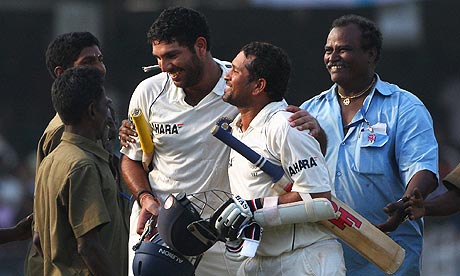
Was this karma, the cause and effect as defined in Hinduism? Was this Test match, not just India's stunning beautiful victory but the fact that ultimately it was fashioned so perfectly by the genius of Mumbai's most celebrated figure, simply meant to be after the atrocity inflicted on that vibrant city a fortnight ago? Or was it merely a magnificent sporting contest, as good as any cricket can be when given extra meaning by the peculiar circumstances that surrounded it?
I'm a romantic and lean towards the former. I like to think that sometimes things happen for the right reason and although the England team would have been disconsolate in the immediate aftermath of the match, with the celebratory clamour around them, the softer hours of their wind-down time may persuade them that this was one such occasion.
There was no disgrace to be had in losing at Chepauk. I hope, indeed I'm sure, that Kevin Pietersen will have reminded his team of this and then of the part they played in an event of massive significance on the subcontinent, firstly by turning up to play where others may have allowed their natural reservations to take precedent, and then, as with their opponents, competing in such a feisty manner. The financial donations they made towards emergency funds were a fine gesture but the biggest gesture of all was being there.
By all the natural laws that govern the progress of Test matches, England should have won the match. Another time they would have. The batting of Andrew Strauss and Paul Collingwood (two players, lest it be forgotten, who have been scrabbling for their Test careers throughout the past year) and disciplined bowling from an attack properly balanced for the anticipated conditions had set up a situation as the fourth day headed into the final session for which they would have grasped greedily had it been offered before the match began. On a wearing fifth-day pitch, slow but offering help for spinners and reverse swing for seamers, they might expect to win perhaps 19 times out of 20.
Then, though, comes the genius factor. The fast bowlers broke ranks with the new ball, feeding Virender Sehwag's insatiable appetite for the cut (with Alastair Cook like a coconut in a shy in the gully), and by the start of the final day the brilliant, calculated, carefree assault had reduced the target to manageable proportions. England could no longer afford the côterie of close catchers that would have been expected when the declaration came, leaving the gate ajar.
Sehwag, however, had set the stage for the master. Sachin Tendulkar had a score to settle with this stadium, having once previously, with a stupendous century — one of his very finest, scored despite labouring with a bad back — taken his side to within a spit of a successful run chase against Pakistan, only to falter, along with the India lower order, with the finishing post in sight. This time, in the course of constructing an innings so sublimely suited to the conditions that it should be made available to coaches everywhere, he found an ally in Yuvraj Singh, a devastating one-day batsman returned to the Test side to resume an unfulfilled career, susceptible to the fast short ball from which he is given immunity by unfair one-day regulations, and worked over magnificently by Andrew Flintoff in the first innings in such a way that it reinforced how Test cricket can provide scintillating passages of play for which there is just no time in the limited-overs game.
Yuvraj played his perfect part but the day, the match and the country demanded it belong to Tendulkar. It could not have been scripted more perfectly: a boundary to win the match and complete a century. It had to have been preordained. Had to be. And Tendulkar's articulate, measured summary of what it all meant, even as the euphoria reigned all around him and the adrenalin still coursed through his veins, placed it all into a proper context.
 New Delhi: It looks like Mahendra Singh Dhoni will have to pay a price for enjoying a break away from cricket. The Indian skipper has lost his captain's cap of the East Zone team to Orissa's Shiv Sundar Das for the upcoming Duleep Trophy matches.
New Delhi: It looks like Mahendra Singh Dhoni will have to pay a price for enjoying a break away from cricket. The Indian skipper has lost his captain's cap of the East Zone team to Orissa's Shiv Sundar Das for the upcoming Duleep Trophy matches.











